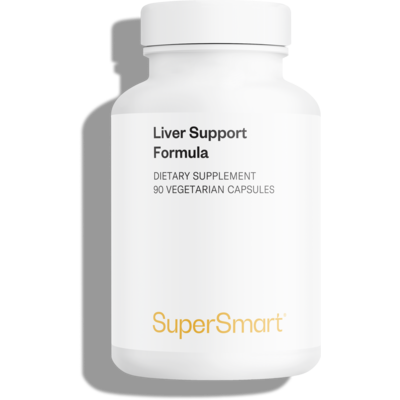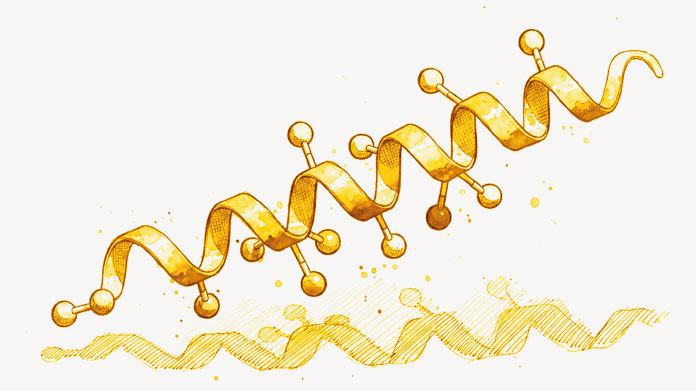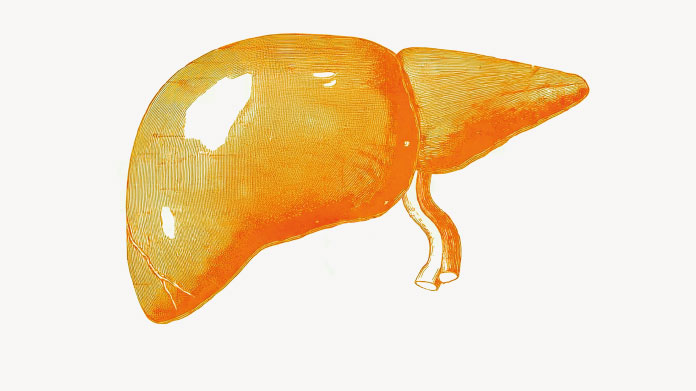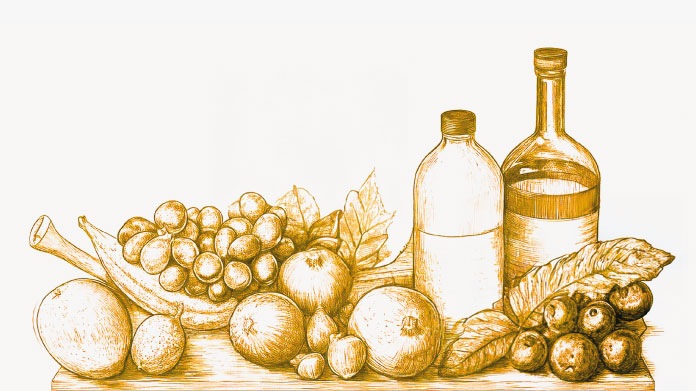Protein diet to reduce an enlarged liver: does it really work?
A new ‘detox’ diet has recently emerged: a high-protein diet to reduce an enlarged liver. But does it really work? What are the risks of such an approach? And are there any alternatives for achieving the same end?
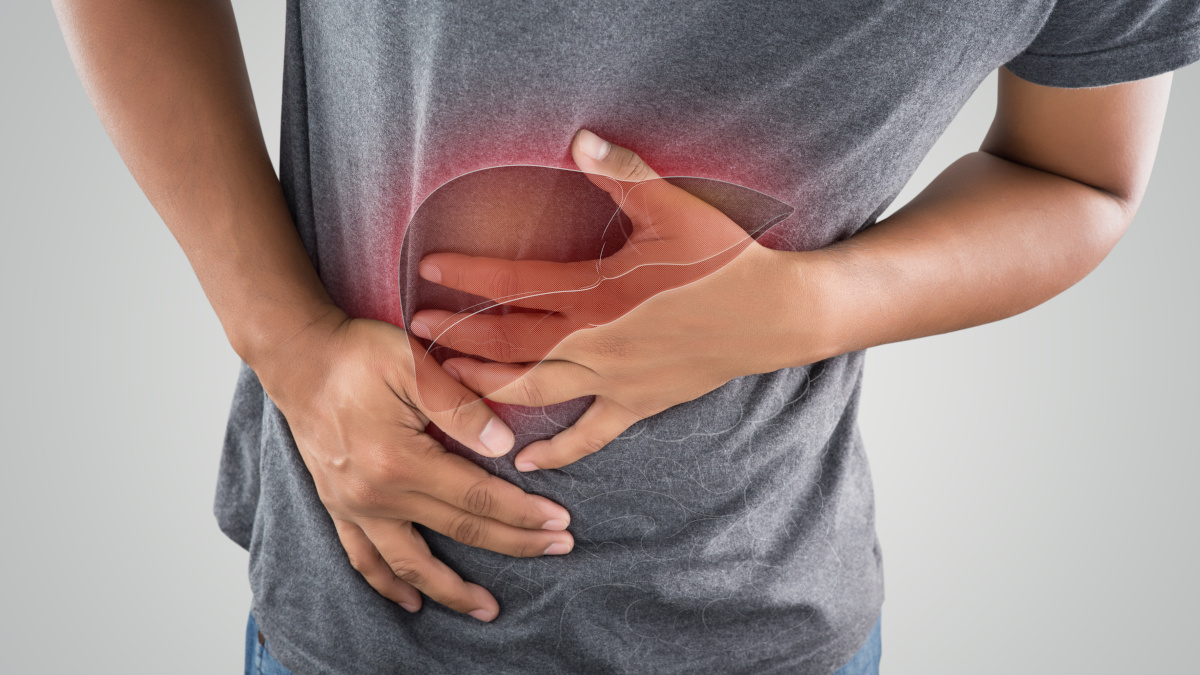
Enlarged liver: warning, danger
Hepatomegaly: symptoms
The term hepatomegaly means enlargement of the liver. The body’s biggest internal organ, the liver is made up several lobes and can thus expand in a homogeneous or heterogeneous way. In either case, hepatomegaly normally manifests in various symptoms:
- discomfort in the abdomen and sometimes bloating;
- sensitivity of the organ to touch;
- dark-colored urine;
- nausea;
- weight loss and lack of appetite;
Hepatomegaly: causes
Hepatomegaly can have a number of causes: hepatic steatosis (fatty liver) (alcoholic or non-alcoholic), liver inflammation (viral, drug-induced or non- viral), a tumor in the liver, heart failure, a disease of the immune system, excess iron, etc. (1)
That’s why in all cases of hepatomegaly, it’s important to consult a doctor so that further investigations can be carried out and an accurate diagnosis made.
A protein diet to reduce an enlarged liver
Protein diet, the liver and weight loss
One cause of hepatomegaly is non-alcoholic fatty liver disease (NAFLD) related to metabolic syndrome. Here, fatty liver disease is caused by excess weight or obesity, in a similar way to the geese force-fed to produce the famous foie gras of south-west France.
In this context, a a diet aimed at weight loss is one of the first recommendations for reducing an enlarged liver (2).
And a high-protein diet can, to some extent, be the right approach for achieving weight loss (though it’s not without risk, as we’ll see later). A diet such as this allows you to consume a relatively large amount of food (animal protein) with a low calorie density, satisfying your hunger without ingesting too many calories.
Generally speaking, however, what causes so many problems for liver health is an unhealthy diet high in saturated fats and simple sugars, coupled with a sedentary lifestyle. Thus a balanced diet containing healthy fats, pulses and wholegrains, lean protein, and plenty of fresh fruit and vegetables, is still the best solution (3).
Protein diet for reducing an enlarged liver: dangers
This is because, as mentioned, high-protein diets are not without risk. For some years now, health authorities have been warning about the risks this type of diet poses to the kidneys: too much protein in the diet can, for example, lead to hypercalciuria (excess excretion of calcium in the urine due to continuous filtering of the blood to eliminate protein breakdown products).
In fact, protein upsets the body’s acid-base balance by making it more acid. You therefore need to take great care to ensure you eat large amounts of fresh fruit and vegetables and to stay well-hydrated to prevent protein-related kidney damage.
What’s more, a high-protein diet has been shown in other studies to lead to increases in liver triglycerides and markers of alcoholic fatty liver disease.
The reason for this is quite simply the liver’s key role in protein metabolism. Once protein from food has been broken down into amino acids in the gut, the liver uses these amino acids to make protein for the body.
Any excess amino acids can then be directed towards the muscles or converted into urea and excreted in urine. In addition, some protein is converted during digestion into ammonia, a toxin which needs to be detoxified by the liver (4).
And that’s where the problem lies: over-consumption of protein means the liver has to work hard to process a an excessive amount of ammonia, which causes inflammation.
So we can see that a protein diet is not such a great idea for reducing an enlarged liver!
Answers to your liver detox questions
Worst foods for the liver
The liver plays a key role in metabolising fats and sugars. Certain foods can therefore aggravate liver problems and should be avoided. These include foods high in saturated fats and added sugars, such as fried foods, ready-meals and sugary drinks.
3-day natural liver-cleanse
There are a number of methods which it’s claimed can cleanse the liver in just a few days. But it’s important to understand that the liver is a complex organ which takes time to regenerate. Three-day diets or liver-cleansing methods can thus be ineffective and even dangerous.
How long does it take to detox the liver?
The amount of time needed to cleanse the liver depends on the severity of the problem and the organ’s ability to regenerate. It’s best to consult a health professional who can assess the condition of your liver and provide personalised advice.
Natural liver detox
You can support the health of your liver by adopting a healthy lifestyle. This means eating a balanced diet, with plenty of fruit, vegetables and wholegrains, and staying well-hydrated. In addition, certain foods such as garlic (5), turmeric (6) and grapefruit are considered beneficial for liver health.
Cleansing the liver: risks
It should be noted that some liver-cleansing methods, including extreme diets or the use of detox products without medical supervision, can put your health at risk. It’s important to seek safe options only and to consult a health professional before undergoing any kind of liver detox.
Pharmacy drugs for cleansing the liver
There is no specific medication available at pharmacies for cleansing the liver. Certain drugs may be prescribed for specific liver conditions but they must be taken under medical supervision and should not be used for the purpose of detoxing the liver.
How to clear fat from the liver naturally
To eliminate fat from the liver naturally, you need to take a holistic approach. This involves changing your diet to reduce your intake of saturated fat and added sugars, and increasing your level of regular exercise. Gradual, sustained weight loss can help to reduce accumulated fat in the liver.
Liver dysfunction and weight gain
It’s important to note that liver problems can lead to weight gain and make it difficult to lose weight. Liver dysfunction can upset the metabolism of fats and carbohydrates, which can result in weight gain.
Side-effects of a liver detox
Some people may experience side-effects when they undertake a liver detox, including headaches, fatigue, nausea and changes in bowel habits. If you experience persistent or serious side-effects, you should seek advice from a health professional.
Natural and traditional home remedies for the liver
As is so often the case, ‘grandma knows best’ is a useful principle to apply when it comes to caring for the liver naturally.
Traditional home remedies include:
Artichoke
This contains cynarin, a polyphenolic compound of caffeic and quinic acids, which supports good digestion and liver function by stimulating the production of bile. Indeed, artichoke has long been used in the form of infusions for treating digestive disorders (7).
Milk thistle
Known botanically as Silybum marianum, milk thistle contains silymarin, a powerful group of flavonoids now used as a phytotherapeutic treatment for liver problems and dyspepsia. Silymarin is also a potent blend of antioxidants widely-studied for its potential anti-inflammatory and anti-cancer properties (8).
Picrorhiza Kurroa
Here, we’re looking less to our grandmas and more to the East with the inspiration provided by Ayurvedic medicine. A medicinal plant native to the Himalayas, picrorhiza kurroa also helps to support healthy liver function (9).
Chlorella
A single-celled algae, chlorella is found in many freshwater locations across the world and was identified at the end of the 19th century by a Dutch botanist. With a high content of healthy fats, protein, chlorophyll, vitamins, minerals and specific pigments, chlorella also supports liver health (10).
For an effective detox then, the best approach is to eat a healthy, balanced diet, stay well-hydrated and perhaps support the health of your liver by drinking herbal teas made from traditional medicinal plants or taking dietary supplements that contain these plants’ active ingredients (such as Liver Support Formula).
SuperSmart ADVICE
References
- KAUDE, Jüri V. et DELAND, Frank. Hepatomegaly. Medical Clinics of North America, 1975, vol. 59, no 1, p. 145-167.
- DUNN, Winston et SCHWIMMER, Jeffrey B. The obesity epidemic and nonalcoholic fatty liver disease in children. Current gastroenterology reports, 2008, vol. 10, no 1, p. 67-72.
- TOSHIMITSU, Kumiko, MATSUURA, Bunzo, OHKUBO, Ikuko, et al.Dietary habits and nutrient intake in non-alcoholic steatohepatitis. Nutrition, 2007, vol. 23, no 1, p. 46-52.
- https://www.liver.ca/wp-content/uploads/2020/10/Foie-et-alimentation.pdf
- GUAN, Min-Jie, ZHAO, Ning, XIE, Ke-Qin, et al.Hepatoprotective effects of garlic against ethanol-induced liver injury: A mini-review. Food and Chemical Toxicology, 2018, vol. 111, p. 467-473.
- TUNG, Bui Thanh, NHAM, Dong Thi, HAI, Nguyen Thanh, et al.Curcuma longa, the polyphenolic curcumin compound and pharmacological effects on liver. Dietary Interventions in Liver Disease, 2019, p. 125-134.
- KRAFT, K. Artichoke leaf extract—recent findings reflecting effects on lipid metabolism, liver and gastrointestinal tracts. Phytomedicine, 1997, vol. 4, no 4, p. 369-378.
- FLORA, Kenneth, HAHN, Martin, ROSEN, Hugo, et al.Milk thistle (Silybum marianum) for the therapy of liver disease. The American journal of gastroenterology, 1998, vol. 93, no 2, p. 139-143.
- SHETTY, Sapna N., MENGI, Sushma, VAIDYA, Rama, et al.A study of standardized extracts of Picrorhiza kurroa Royle ex Benth in experimental nonalcoholic fatty liver disease. Journal of Ayurveda and integrative medicine, 2010, vol. 1, no 3, p. 203.
- PANAHI, Yunes, GHAMARCHEHREH, Mohammad Ebrahim, BEIRAGHDAR, Fatemeh, et al.Investigation of the effects of Chlorella vulgaris supplementation in patients with non-alcoholic fatty liver disease: a randomized clinical trial. Hepato-gastroenterology, 2012, vol. 59, no 119, p. 2099-2103.
Keywords
5 Days
Easy to navigate site
Easy to navigate site, had what I was searching for, good price. easy order-check out
James Tucker
11 Days
My skin is clearing up nicely!
Pretty good for my skin so far.
Christian
13 Days
The new packaging is excellent
The new packaging is excellent - finally! No more squashed boxes and torn envelopes.
GORAN
14 Days
Great Product
Great Product
Larry Garrett
18 Days
Quick shipping
Quick shipping; good price. No issues!
Mary McCarty
20 Days
Thr product is very good and is helping…
Thr product is very good and is helping me on my health. Then is always on time
LUGO Luz
22 Days
Buying was fine
Buying was fine. I had problems with the website not recognizing my login info, and had to call to get it fixed. Other than that, everything was good.
David S. Clark
23 Days
Your super maca and super ginseng are…phenomenal
Your super maca and super ginseng are phenomenal supplements that compliment each other when taking them together. Fantastic feeling of well-being and lots of mid day energy without the crash.
Keith Mason
25 Days
I have had amazing results with every…
I have had amazing results with every supplement I've purchased. I am extremely satisfied with this company
kirstin Torres
25 Days
Fine products
Fine products . They are on the leading edge of online supplements. The only issue -so far-is they sometime run out of subscription items.
Jason Argos
28 Days
The ordering process is very user…
The ordering process is very user friendly and the products always come in a timely manner.
CARTER Rhonda
29 Days
The price for Dr
The price for Dr. Pero's AC-11 is reasonable and in line with his views. (my former colleague). Keep it pure.
CAMPBELL Clayton
32 Days
Right on every time.
Right on every time.
Arthur Nicholas
35 Days
They are cheaper than everyone else and…
They are cheaper than everyone else and the shipping was fast. Great company.
Patricia Adams
42 Days
Availability of quality health…
Availability of quality health supplements and it's wide variety is impressive. Ordering is seamless and shipping even during the holidays is well streamlined.
Mohamad Hussein


